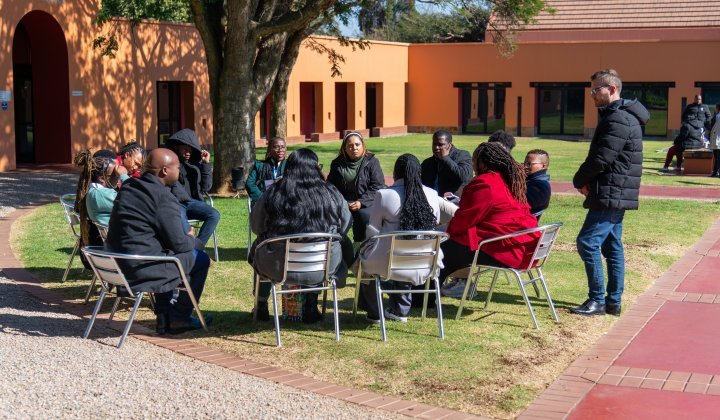In strategy, we often advocate that you should understand your core competencies and then seek to apply them in different ways to achieve your goals. And when facing uncertainty, the advice is to communicate often, openly and honestly.
In these ways, it is said, authentic leaders can lead effectively in times of great uncertainty and change.
Natural instincts
Because we are social beings — and our brain is a social organ — communication is a natural instinct. So is staying safe and seeking security and comfort in our surrounding circumstances.
In times of great uncertainty and change, these natural instincts come to the fore even more. Indeed, the natural instincts in these times are acting and moving quickly away from danger, controlling what you can, and listening to your gut feeling.
But, as a leader, this may not be the best way to respond. And it has to do with the way that your brain reacts in crises and uncertain situations.
Natural instincts are often reflexive behaviour
We know that the brain defaults to reflexive behaviour in times of uncertainty and perceived danger. These are non-conscious behaviours scripted into who we are and how we have evolved over thousands of years.
When we observe leaders in times of great uncertainty and change, we may detect some of the following behaviours:
- Acting quickly to move the organisation to a safer and more comfortable situation.
- Communicating frequently and openly.
- Controlling as many factors as possible in an uncertain environment.
- Acting tough and fearless (the well-known “fight” response).
- Being incredibly busy all day by responding to the many urgent demands of the situation.
‘Unnatural’ behaviours may be more productive
As natural as the behaviours above may appear, the paradox is that they are not necessarily the most productive approach for leaders when conditions are uncertain and changing.
Instead, we should consider the following five approaches to enhance leadership effectiveness in uncertain and changing situations:
More reflection, less reflexive reaction
While uncertain situations signal danger (to the brain) and promote quick decisions and action, these situations require deeper reflection to ensure that the situation is well understood and the information has been fully processed and considered. In many cases, this may require that leaders temporarily remove themselves from the situation to promote more insightful thinking.
Action is often the enemy of thought, and strategic thinking requires calmer and more reflective conditions.
More clarity, less quantity
The tendency is to over-communicate in highly uncertain and changing circumstances. People are often bombarded by numerous updates, communiqués, and policy announcements. This can be overwhelming and difficult to process and often reduces effectiveness and sound decision-making. People are likely to be busy enough in these situations — no need to add to the burden by increasing the volume (and therefore the complexity) of information.
It is far better to carefully consider what information is required for people to know, exactly what they need to do and why. This may be more effective than complete transparency, which may require significant cognitive effort to process and distil. And cognitive surplus is often at a premium with high levels of uncertainty in the workplace.
More flexibility, less control
Security and the desire for certainty are natural psychological drivers that all of us share to different degrees. And so, many leaders try to control as many variables as they can — particularly when things are highly uncertain. Performance management is often the first target — “let’s make sure that people are doing their jobs and not slacking off”.
Micro-management and denying people reasonable levels of autonomy can become an all-consuming task for leaders — often at the expense of more productive planning and strategy. People get the message that they are not trusted, which impacts morale and productivity. And they spend their time gaming the system as a form of primitive retaliation. It makes more sense to provide reasonable flexibility for people to use their natural ingenuity in coping with uncertainty and change. And it provides leaders more time for dealing with critical issues.
Toughness through vulnerability
Toughness in leaders is usually considered a desirable trait, particularly in times of great uncertainty and change. It is associated with the courage to do what is necessary but unpopular and the ability to face adversity.
On the other end, vulnerable leaders are often thought of as being weak, defenceless and assailable. ‘People won’t follow a weak leader’ is a common saying. The paradox is that the immediate human reaction to vulnerability is not rejection but compassion. Vulnerability is a sign of humanity and is the key to developing greater mental toughness. It also gives the leader freedom to explore new ideas freely and encourages others to do so. In the process, group cohesion, innovation and performance improve, and the leader grows in confidence and resolve.
Steal time from comfort
This interesting idea proposed by Derek Sivers and Seth Godin challenges the notion that leaders have little time for big projects because they are so busy. Instead, Sivers and Godin argue that the real source of “more” time is to steal it from the “comfort” – the things we do because we are comfortable doing them.
In times of uncertainty and change, the comfortable (natural) thing to do is to plunge into the things that demand your attention and with which you can cope. The uncomfortable and unnatural thing to do is to steal time from these activities and address what might make a real difference to the organisation. Stealing time like this will generally feel uncomfortable because it is not natural to do when surrounded by so much uncertainty and change. But it is a sign that you are positioning yourself to make a real difference.
Leading by doing what is “unnatural”
These five approaches can be termed ‘unnatural’ and cause discomfort in some, but with time they may well become your default behaviours in uncertain and changing conditions.
The key learning here is that these behaviours are not the instinctive or natural responses of the brain. Indeed, our instincts are generally quite the opposite. But as Julia DiGangi so eloquently puts it, if you are feeling uncomfortable doing these things, you are on the right track.
If you are feeling uncomfortable doing these things, you are on the right track.
Dr. Norman Chorn is a strategist and organisation development practitioner with the BrainLink Group. He uses principles of neuroscience to address the challenges of developing strategy in a complex and uncertain environment. His areas of focus are strategy in conditions of uncertainty, organisational and cultural alignment, and strategic leadership.




